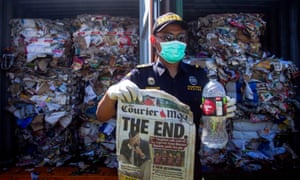Kickstart the domestic market so Asian countries rejecting Australian waste is no longer a problem, industry suggests

Australia could quickly solve the problem of Indonesia and other countries rejecting its waste if governments invested in recycling manufacturing as promised and required the use of recycled material in public projects, industry and environmental groups say.
Jakarta announced on Tuesday it would return 210 tonnes of Australian household rubbish – the latest demonstration of opposition in south-east Asia to receiving exported waste. Indonesia, the Philippines and Malaysia have each turned back shipments and warned they would not become dumping grounds for developed countries after China banned imports of foreign plastic rubbish.
Peter Shmigel, the head of the Australian Council of Recycling, which represents about 70 companies, said countries in the region were increasingly focused on their own waste issues and less inclined to accept it from overseas. “Indonesia has not changed the level of contamination in the waste it will take, it’s just enforcing the rules,” he said.
He said federal and state governments could address the issue by helping finance new plants and introducing procurement rules that required departments and agencies to use recycled material.
He said it would kickstart a domestic recycling market that would prevent recyclable material kept in Australia sitting in stockpiles or going to landfill. About 90% of waste that does not go to landfill stays in Australia and 10% is exported.
“Invest and buy – they are the two big things,” he said.
Shmigel said one major project could be enough to make a difference to the industry.
“If the federal government decided tomorrow that the 27km of roads and tunnels required for Snowy Hydro 2.0 was to be built out of recycled products you wouldn’t have an export problem,” he said.
The Morrison government has promised a $100m recycling investment fund to support manufacturing of recycled-content products, including plastics, paper and pulp. Victoria, New South Wales, Queensland and South Australia have made multimillion-dollar recycling investment pledges.
Shmigel’s call was backed by Jeff Angel, the director of advocacy group the Total Environment Centre. Angel said investment in glass and aluminium reprocessing plants, both new and existing, was important but did not address the biggest problem.
“It’s not that we don’t have the reprocessing facilities but they lack access to clean material and markets to sell their products,” he said.
Angel said the success of container deposit schemes, under which people are paid for bottles and cans returned for recycling, showed a way ahead. Victoria is the only state or territory that does not have a container deposit scheme or is not promising one. “This is exactly what should be happening for a range of items that are being put in a yellow (recycling) bin,” he said.
The assistant minister for waste reduction and environmental management, Trevor Evans, said tackling waste was a key priority for the government, pointing to a promised $167m in investment that included developing recycling schemes for batteries, electrical and electronic products, solar systems and plastic oil containers.
Evans said the government wanted to reduce waste and increase recycling to help the environment, ensure the integrity of recycling exports and promote local industries and jobs.
Shmigel said the federal and state governments needed to move beyond a system of voluntary targets such as increasing recycling or composting of plastic packaging to 70% by 2025.
“Nowhere in the world have we seen a voluntary system get to that sort of number,” he said.
Evans said the government had asked Indonesian authorities for further information about any concerns they have with recyclable material shipped from Australia.
“If companies are breaching the rules when trading recyclables here or in Indonesia, then they are letting their industry and all Australians down, and there needs to be appropriate compliance and enforcement,” Evans said.








